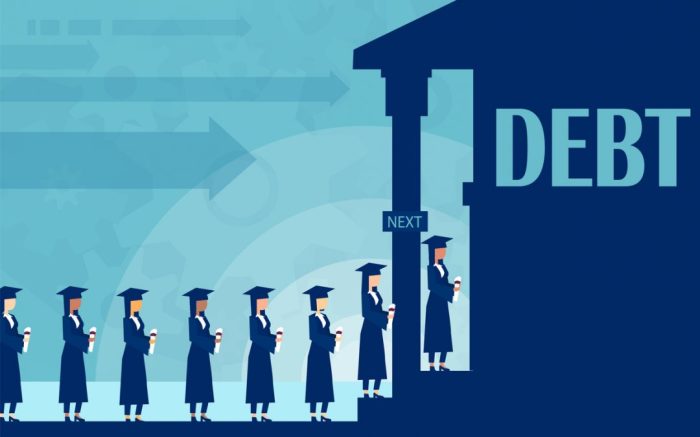Diving into the world of managing student debt, buckle up as we explore ways to navigate through the financial maze of loans and repayments. Get ready for some real talk on how to handle this crucial aspect of post-grad life.
In this guide, we’ll break down the ins and outs of student debt, from understanding what it is to discussing effective management strategies that can help you stay on top of your finances.
Understanding student debt
Student debt refers to the money borrowed by individuals to pay for their college education. This debt is acquired through student loans that must be repaid with interest after the individual graduates.
Types of student loans
- Federal student loans: These loans are provided by the government and have fixed interest rates. They offer various repayment options and benefits.
- Private student loans: These loans are offered by banks, credit unions, or other private lenders. They usually have higher interest rates and fewer borrower protections compared to federal loans.
Implications of student debt
- Financial burden: Student debt can lead to financial stress and impact an individual’s ability to achieve other financial goals, such as buying a home or saving for retirement.
- Economic impact: High levels of student debt can slow down economic growth as individuals have less disposable income to spend on goods and services.
- Social consequences: Student debt can also contribute to widening wealth gaps and inequality, as not everyone has equal access to education or the ability to repay their loans.
Managing student debt effectively
When it comes to managing student debt effectively, there are a few key strategies to keep in mind. By taking proactive steps while still in school and planning ahead for post-graduation, you can minimize the financial burden of student loans.
Minimizing student loan debt while in school
- Consider part-time work or paid internships to help cover expenses and reduce the need for loans.
- Apply for scholarships, grants, and other forms of financial aid to lower the amount borrowed.
- Avoid taking out more loans than necessary by budgeting carefully and living within your means.
- Explore options for work-study programs that can provide income while gaining valuable experience.
Budgeting and financial planning post-graduation
- Create a detailed budget that includes all monthly expenses, including student loan payments.
- Consider consolidation or refinancing options to potentially lower interest rates and simplify repayment.
- Set up automatic payments to ensure timely payments and avoid late fees or negative impacts on credit score.
- Explore income-driven repayment plans or forgiveness programs if struggling to make payments after graduation.
Importance of timely payments and loan consolidation
- Timely payments help build a positive credit history and avoid defaulting on loans.
- Loan consolidation can combine multiple loans into one, potentially lowering monthly payments and simplifying repayment.
- Consolidation may also offer the opportunity to switch to a fixed interest rate, providing more stability in repayment planning.
Loan repayment options

When it comes to repaying your student loans, there are various options available to suit your financial situation. Understanding the different repayment plans can help you choose the best one for your needs.
Standard Repayment Plan
The standard repayment plan is the most common option, where you make fixed monthly payments over a period of 10 years. While this plan allows you to pay off your loans quickly, the monthly payments may be higher compared to other plans.
Income-Driven Repayment Plans
Income-driven repayment plans adjust your monthly payments based on your income, making it more manageable to repay your loans. Examples include the Income-Based Repayment (IBR) plan, Pay As You Earn (PAYE) plan, Revised Pay As You Earn (REPAYE) plan, and Income-Contingent Repayment (ICR) plan. These plans typically extend the repayment period beyond 10 years, which can result in paying more interest over time.
Graduated Repayment Plan
Under the graduated repayment plan, your payments start lower and increase over time, usually every two years. This option is beneficial if you expect your income to increase steadily in the future. However, be prepared for higher monthly payments in the later years.
Loan Forgiveness Programs
Loan forgiveness programs, such as Public Service Loan Forgiveness (PSLF) and Teacher Loan Forgiveness, provide eligible borrowers the opportunity to have a portion of their loans forgiven after meeting specific criteria. For example, PSLF requires working full-time for a qualifying employer and making 120 qualifying payments.
Pros and Cons
- Standard Repayment Plan: Pros – Pay off loans quickly, Cons – Higher monthly payments
- Income-Driven Repayment Plans: Pros – Adjusted payments based on income, Cons – May pay more interest over time
- Graduated Repayment Plan: Pros – Lower initial payments, Cons – Higher payments later on
- Loan Forgiveness Programs: Pros – Opportunity for loan forgiveness, Cons – Criteria requirements must be met
Dealing with financial challenges
When facing financial challenges while repaying student loans, it’s important to stay proactive and seek assistance when needed. Here are some tips to help you navigate through tough times:
Seeking assistance or loan deferment
- Reach out to your loan servicer: They can provide guidance on available options such as income-driven repayment plans or loan deferment.
- Explore hardship programs: Some lenders offer programs for borrowers experiencing financial difficulties, providing temporary relief.
- Consider loan consolidation: Consolidating your loans can potentially lower your monthly payments and make them more manageable.
Consequences of defaulting on student loans
- Damage to credit score: Defaulting on student loans can severely impact your credit score, making it harder to secure loans in the future.
- Legal consequences: Lenders can take legal action to collect the debt, leading to wage garnishment or even lawsuits.
- Losing eligibility for financial aid: Defaulting on loans can make you ineligible for future financial aid, affecting your ability to pursue higher education.
Remember, it’s essential to communicate with your loan servicer and explore all available options to avoid defaulting on your student loans.
